Unclaimed mail, missing friends and the dead letter office.
An issue which can torment researchers of pre-21st Century times is the missing letter: the failed communication, the lost opportunity to contact a friend, relative or business. What critical love letter, piece of family news, financial assistance, secrets, or other life-changing messages were lost? Why was it such a problem? What was the fate of the lost messages and parcels?
For the 19th and most of the 20th Century, mailed messages, newspapers and goods were a vital link around the Australian continent as well as to and from the rest of the world. However, dealing appropriately with getting them to the right person and place in a reasonable time was a constant challenge and often under review. Newspapers and gazettes in the 19th Century regularly published lists of unclaimed mail. Missing friends’ columns and personal advertisements were also common in a country of vast distances and a population on the move, especially with gold fever. The Scottish press commented about these messages during the Victorian gold rush as “characteristic” and “peculiar in its origin and use to Australia”. Empire 30 January 1854 p8
What were the problems of mail delivery?
No idea of the address
Mail within and outside Australia was frequently inadequately informative and addressed based on an assumption that those within a region would somehow find the right person.
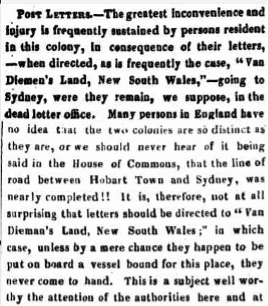
The Launceston Advertiser 1 February 1832 p37 explained the basic ignorance the British often had of Australia, a place described as “beyond the seas”.
Failure to meet post office regulations
In 1834 the first post office was established in Brisbane. In 1846 the Moreton Bay inland service started with Ipswich as the first postal town en route to the Darling Downs. Postage was paid when mail was collected until 1852 when pre-paid mail became the norm. Mail might not be collected by those not wishing to receive the mail unless it was pre-paid. Newspapers, popular items to overseas families, were often flimsily wrapped and along with poorly secured mailed items came adrift from the address and so were lost. Items which should have been declared were discovered. These included coins and jewellery buried in substances such as salt. Each year the post office commented on the large sums of unclaimed money held because of poor address information or insecure wrapping.
Problems with transporting the mail
Janet Spillman described the challenges facing her 19th Century ancestor, Edward Lord, an early postmaster in Drayton in Queensland Lords : Edward & Eliza Lord’s colonial family p106 “Mail contractors travelled the Postman’s Ridge bridle track between Drayton and Ipswich, following the ridges so that the contractor could see any would-be attackers. Each carrier picked up mail en route to hand to the post office in the next mail town.” She outlined the hazards and delays in delivering mail. Letters and newspapers, not just from overseas, often needed to be transhipped before reaching the port of destination. Items arriving in Sydney coming to Brisbane and then further on could take months. Mail carriers and postal officers were called to account when angry individuals and businesses did not receive their mail at all or in a timely and convenient way. Floods, fires and bushrangers; the problem of tired and injured horses over difficult terrain and long distances; the mail carrier’s temptation to theft and alcohol – all could challenge mail timetables and reliable delivery.
The dead letter office
This is where undeliverable, uncollected mail went and various attempts to locate addressees were made. Mark Twain remarked that the Dead Letter Office in London was “a monument to the stupidity of the people”. Very many dead letter offices around the world joined a chorus of agreement. Absent-minded addresses from businesses were one problem. A farmer’s widow submitted a list of her late husband’s property. The final item after the implements and various stock including numbers of cows and poddies was “jersey bull”. The acknowledgement took the form of addressing the widow as Mrs Jersey Bull. Various newspapers ran the item.
Vast sums of money were sent through the post with insufficient postage, or in error for letters. People regularly posted pay packets needed to pay rent and brought their unposted letters home. Jewellery, gloves and other valuables were also accidentally sent down the mail chute instead of mail. Arguments with the post office could be unreasonable. A woman complained that she had not received her Christmas card from home which had come regularly for eighteen years. There could only be one explanation. “Where is it? Have a good look. It must be there.” On another occasion, a man complained that the slit in the postage box was too small. When it was investigated, it turned out he was putting his mail in a disused petrol bowser. These stories did the rounds of newspapers.
Another problem was those who wrote in a foreign language. The Chinese script, in particular with its diversity, was often hard to interpret although the main post offices employed Chinese for that purpose. Europeans might address mail with a name and a state only.
Post office and trade directories were among the tools used to locate addresses with insufficient detail, combined with the long experience of the postal officers. Mail could be opened to determine further clues to the addressee’s name and check property. After a month a letter could be destroyed.
These are just a few of the many anecdotes associated with missing mail. Newspapers regularly ran the stories because of the humour, misfortune and ignorance associated with them. They are now mostly something of the past in the days of electronic media, the decline of the postal service to alternate business days and the rising cost of stamps. However, the failure in a previous time for people to make contact via the mail service and its possible consequences, provides researchers with gaps they want to fill as they wonder if, how and when mail reached its intended destination.
Find out more…
* Check Trove for missing friends, unclaimed mail, regulations, mail issues, stories, and images of mail transport over time.
* Read the chapter on ‘Post Office politics’ in Janet Spillman’s Queensland Lords : Edward & Eliza Lord’s colonial family
* Find out about Moreton Bay’s mail service in The Moreton Bay Postal System: notes on the Post Office, Brisbane 1824-1859 by F W S Cumbrae-Stewart.

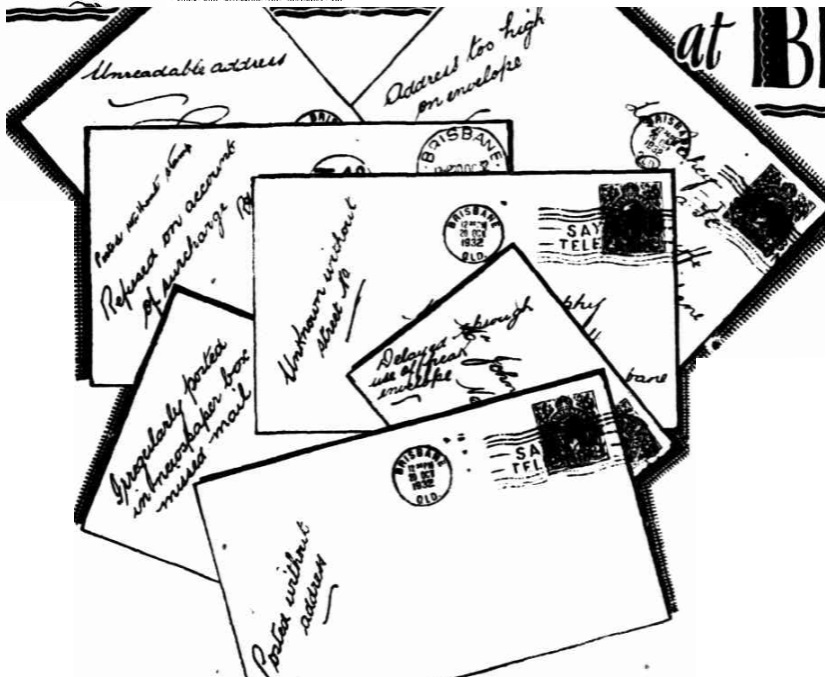
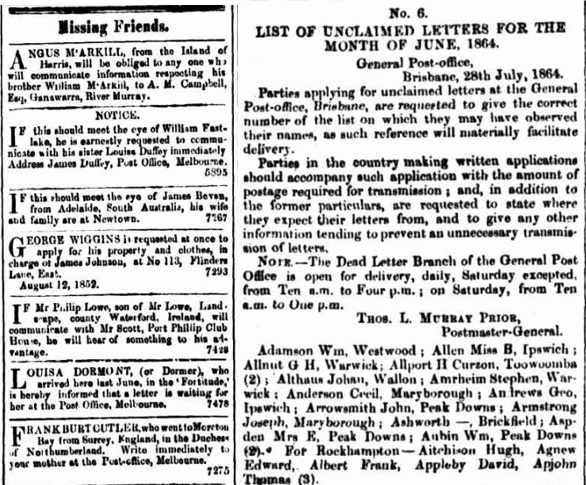
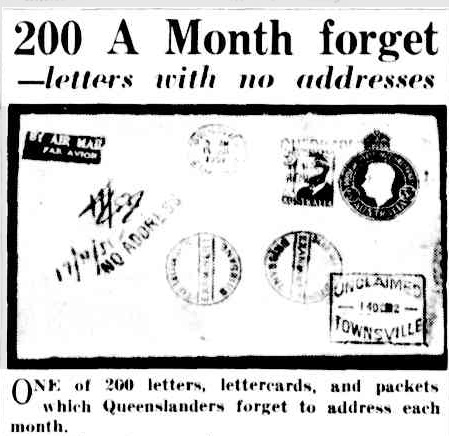
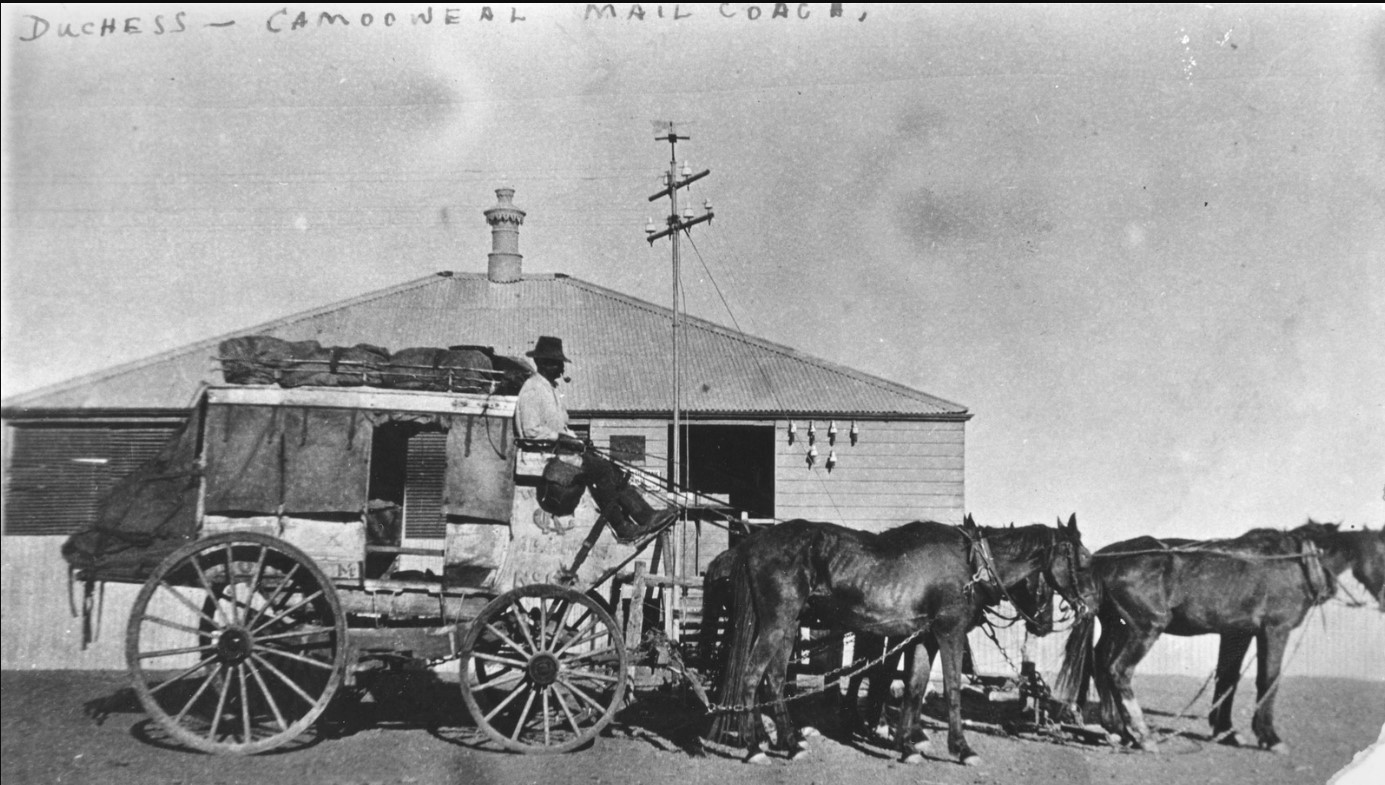
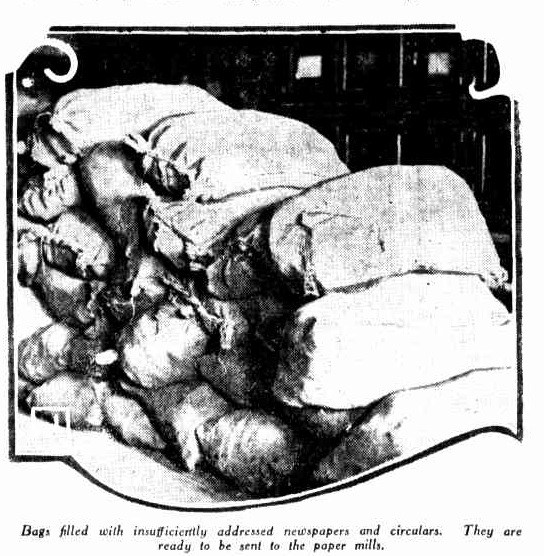
Comments
Unclaimed mail, missing friends and the dead letter office. — No Comments
HTML tags allowed in your comment: <a href="" title=""> <abbr title=""> <acronym title=""> <b> <blockquote cite=""> <cite> <code> <del datetime=""> <em> <i> <q cite=""> <s> <strike> <strong>